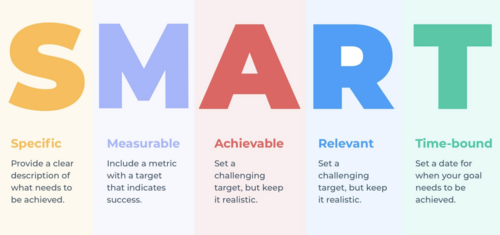SMART goals in project planning and performance management
>>>Work in progress<<<
Considering the obstacles an effective goal setting can encounter such as lacking organisational capabilities or resistance to change, e.g due to individual anxiety, creating and implementing appropriate goals seem to be challenging. However, in a dynamic company environment establishing effective goals followed by developed action plans is of great importance in any project management process. Initially created by George T. Doran in the Management Review[1], the SMART goals can be classified as an effective goal setting technique. The acronym SMART stands for: Specific, Measurable, Achievable, Relevant, Time bound.
Being in line with the purpose perspective of projects, this goal setting method is not only applicable in professional projects, but also in any project of private nature. Using this tool allows to generate success substantially related to its original efforts, which is of high value for any project manager. Due to the SMART goals' great scope in diverse industrial areas, a deep investigation of the SMART traits and simultaneously a critical reflection of its potential limitations will be conducted as follows.
Contents |
Introduction
Organisations such as companies aim to create benefits and to reach outcomes or goals, respectively[2]. This process is often initiated by establishing a vision which is translated into measureable goals in the project planning phase on an organisation's strategic, tactical or operational level. Next to the performance evaluation of the proposed goals, goals create a direction(QUELLE-MANAGEMENT REVIEW) which allows to be followed throughout the phases of any project management process[3].
As any managerial task such as a planning process is accompanied by uncertainties[4] that can lead to ambiguity and fallacy, an effective way of setting achievable goals is absolutely essential(QUELLE finden, wo es angesprochen wurde!!!!!) to mitigate negative outcomes(AUSDRUCK).
for success validation necessary
goals also for further development necessary (next to direction) (QUELLE-Managementreview)
ADD more about Goals vgl SPM
Why SMART?
Initially created by George T. Doran in the Management Review[1], the SMART goals can be classified as an effective goal setting technique. The acronym SMART stands for: Specific, Measurable, Achievable, Relevant, Time bound.
Using this tool allows to generate success substantially related to its original efforts, which is of high value for any project manager.
establishing effective goals followed by developed action plans is of great importance in any project management process(QUELLE-MANAGEMENT REVIEW)
Application: How to be SMART?
Guidance
Case studies
Project management phases: Planning, performance measurement, time management
>>>Further consideration in program/portfolio management
Limitations
Bias, human resistance
effective goal setting can encounter such as lacking organisational capabilities or resistance to change, e.g due to individual anxiety (QUELLE-Managementreview)-requires critical reflection of capabilities and encountering unpleasant realisation of lacking capabilities
Other techniques?
goals not ambitious enough
strictly following of guidance can lead to disregard better solutions
Conclusion
Annotated bibliography
- ↑ 1.0 1.1 Management Review, 1981, http://community.mis.temple.edu/mis0855002fall2015/files/2015/10/S.M.A.R.T-Way-Management-Review.pdf, Retrieved September 20, 2017
- ↑ PMI, The Standard for Project Management, 2013, p26-29
- ↑ PMI, XXX, https://www.pmi.org/learning/library/project-management-middle-five-stages-6969, Retrieved September 20, 2017
- ↑ Gareth R. Jones, Essentials of Contemporary Management, 2015, p9
- ↑ Megan M. Flores, 2017, https://www.achieveit.com/resources/blog/history-evolution-smart-goals/, Retrieved September 20, 2017